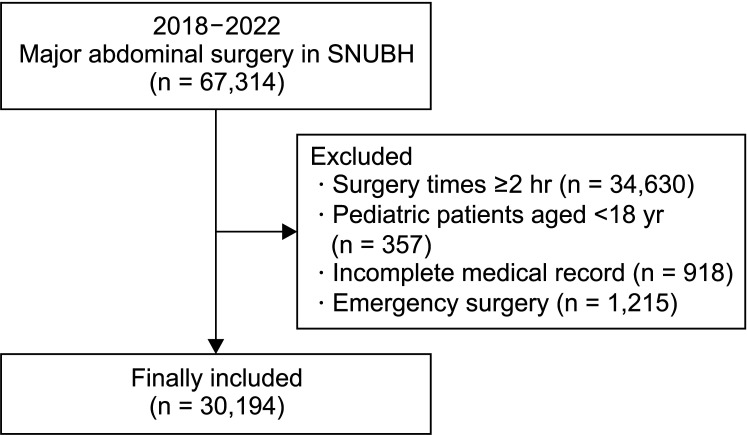Ann Surg Treat Res.
2024 Aug;107(2):120-126. 10.4174/astr.2024.107.2.120.
Exposure to postoperative hypothermia and its association with complications after major abdominal surgery: a retrospective cohort study
- Affiliations
-
- 1Department of Anesthesiology and Pain Medicine, Seoul National University Bundang Hospital, Seongnam, Korea
- 2Interdepartment of Critical Care Medicine, Seoul National University Bundang Hospital, Seongnam, Korea
- 3Department of Anesthesiology and Pain Medicine, Seoul National University College of Medicine, Seoul, Korea
- KMID: 2558388
- DOI: http://doi.org/10.4174/astr.2024.107.2.120
Abstract
- Purpose
Many patients who undergo major abdominal surgery experience inadvertent hypothermia during the perioperative period. This study aimed to identify risk factors related to postoperative hypothermia and their association with postoperative complications.
Methods
This retrospective cohort study used data from Seoul National University Bundang Hospital, a tertiary university medical center in South Korea, between January 1, 2018 and December 31, 2022. We included patients aged ≥18 years who underwent elective major abdominal surgery for more than 2 hours in the operating room. The patients were categorized into the hypothermia (body temperature <36.5 °C) and non-hypothermia (body temperature ≥36.5 °C) groups.
Results
The study sample comprised 30,194 patients, and we classified 21,293 and 8,901 into the hypothermic and nonhypothermic groups, respectively. Some factors associated with the occurrence of postoperative hypothermia included the type of surgery. In the multivariable logistic regression model, the incidence of postoperative complications was 9% higher in the hypothermia group than in the non-hypothermic group (odds ratio [OR], 1.09; 95% confidence interval [CI], 1.01–1.19; P = 0.040). Among postoperative complications, the hypothermic group showed a 14% higher incidence of acute kidney injury (OR, 1.14; 95% CI, 1.04–1.25; P = 0.007) than the non-hypothermic group.
Conclusion
The appearance of postoperative hypothermia during the first 30 minutes of the recovery period was significantly associated with the appearance of postoperative complications, especially acute kidney injury. However, further studies are required to validate these findings.
Figure
Reference
-
1. Hart SR, Bordes B, Hart J, Corsino D, Harmon D. Unintended perioperative hypothermia. Ochsner J. 2011; 11:259–270. PMID: 21960760.2. Burger L, Fitzpatrick J. Prevention of inadvertent perioperative hypothermia. Br J Nurs. 2009; 18:11141116–1119. PMID: 19966730.3. Kurz A. Physiology of thermoregulation. Best Pract Res Cl in Anaesthesiol. 2008; 22:627–644.4. Leslie K, Sessler DI. Perioperative hypothermia in the high-risk surgical patient. Best Pract Res Clin Anaesthesiol. 2003; 17:485–498. PMID: 14661653.5. Wagner D, Hooper V, Bankieris K, Johnson A. The relationship of postoperative delirium and unplanned perioperative hypothermia in surgical patients. J Perianesth Nurs. 2021; 36:41–46. PMID: 33067117.6. Rauch S, Miller C, Bräuer A, Wallner B, Bock M, Paal P. Perioperative hypothermia: a narrative review. Int J Environ Res Public Health. 2021; 18:8749. PMID: 34444504.7. Dae M, O'Neill W, Grines C, Dixon S, Erlinge D, Noc M, et al. Effects of endovascular cooling on infarct size in ST-segment elevation myocardial infarction: a patient-level pooled analysis from randomized trials. J Interv Cardiol. 2018; 31:269–276. PMID: 29243292.8. Niemann CU, Feiner J, Swain S, Bunting S, Friedman M, Crutchfield M, et al. Therapeutic hypothermia in deceased organ donors and kidney-graft function. N Engl J Med. 2015; 373:405–414. PMID: 26222557.9. Kellum JA, Lameire N. KDIGO AKI Guideline Work Group. Diagnosis, evaluation, and management of acute kidney injury: a KDIGO summary (Part 1). Crit Care. 2013; 17:204. PMID: 23394211.10. Sinawe H, Casadesus D. Urine Culture. StatPearls [Internet]. StatPearls Publishing;2024. 01. cited 2024 May 11. Available from: https://www.ncbi.nlm.nih.gov/books/NBK557569/.11. Grover S, Avasthi A. Clinical practice guidelines for management of delirium in elderly. Indian J Psychiatry. 2018; 60(Suppl 3):S329–S340. PMID: 29535468.12. Delanaye P, Cavalier E, Pottel H. Serum creatinine: not so simple! Nephron. 2017; 136:302–308. PMID: 28441651.13. World Health Organization (WHO). Haemoglobin concentrations for the diagnosis of anaemia and assessment of severity [Internet]. WHO;2011. cited 2024 May 11. Available from: https://www.who.int/publications/i/item/WHO-NMH-NHD-MNM-11.1.14. Sessler DI. Temperature monitoring and perioperative thermoregulation. Anesthesiology. 2008; 109:318–338. PMID: 18648241.15. Torossian A, Bräuer A, Höcker J, Bein B, Wulf H, Horn EP. Preventing inadvertent perioperative hypothermia. Dtsch Arztebl Int. 2015; 112:166–172. PMID: 25837741.16. Farley DR, Greenlee SM, Larson DR, Harrington JR. Double-blind, prospective, randomized study of warmed, humidified carbon dioxide insufflation vs standard carbon dioxide for patients undergoing laparoscopic cholecystectomy. Arch Surg. 2004; 139:739–744. PMID: 15249406.17. Oh TK, Ryu JH, Sohn HM, Jeon YT. Intraoperative hypothermia is associated with reduced acute kidney injury after spine surgery under general anesthesia: a retrospective observational study. J Neurosurg Anesthesiol. 2020; 32:63–69. PMID: 30334935.18. Cui Y, Cao R, Deng L. Inadvertent hypothermia and acute kidney injury (AKI) in neonates undergoing gastrointestinal surgeries: a retrospective study. J Perinatol. 2022; 42:247–253. PMID: 34413460.19. Moran JL, Peter JV, Solomon PJ, Grealy B, Smith T, Ashforth W, et al. Tympanic temperature measurements: are they reliable in the critically ill? A clinical study of measures of agreement. Crit Care Med. 2007; 35:155–164. PMID: 17095941.
- Full Text Links
- Actions
-
Cited
- CITED
-
- Close
- Share
- Similar articles
-
- Renal Surgery Using in Situ Hypothermia
- Frequency and Patterns of the Early Postoperative Complications after Abdominal Aortic Surgery
- Postoperative hypothermia in geriatric patients undergoing arthroscopic shoulder surgery
- Utilization of Profound Hypothermia and Total Circulatory Arrest in Surgery
- Partial Nephrectomy Using in Situ Hypothermia


